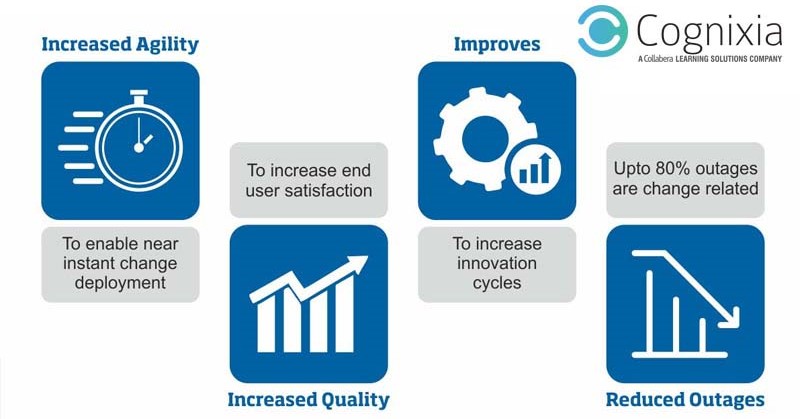DevOps (Development + Operations) is the combination method, and products to enable continuous integration to continuous delivery and continuous deployment. With the ever growing and fast moving technology world, it is imperative for all IT companies to be on top of their game. An old method of developing, integrating, testing and deploying software is a bit too slow for the pace at which the IT industry is growing and expected to grow in future.

The solution of reducing the time that takes from developing to deploying a software is “DevOps” that has emerged as a boon for the IT industry as it makes it easier for development and operations department by integrating the functions of both departments.
DevOps improves the collaboration by integrating the functions between developers and operations teams by automating workflows, automating infrastructure and constantly measuring the application performance. A traditional way of writing large codes take weeks and months then testing and deploying will further take a lot of time. It provides the flexibility of writing codes in a small chunk that is integrated, tested, monitored and deployed in hours and days instead of weeks and months.
Benefits of DevOps
- DevOps allows the increase in the rate of software delivery and improves the company’s response time to client or customers requirements.
- Because of automation, the team can focus on other tasks that will add value to their organization like getting their business and online content better.
How Dev Ops achieves this
DevOps has created a change in the mindset of two teams that works together, the development and the operations team along with the right tools. There are no specific tools for Dev Ops but a “set of tools” or “DevOps tool-chain” consisting of multiple tools like:
- Jenkins – Jenkins helps in building and testing codes continuously.
- Github – Github is used as a tool for source control. It helps in managing, tracking and documenting all the changes to the code for any software.
- Chef, Puppet, and Saltstack – Helps in configuration management. These tools also help in allowing the deployment of applications in an automated fashion across thousands of servers at different locations.
There are various tools to measure the performance of the environment and application continuously.
Generating, reading and analyzing system logs is very useful to monitor an environment, many environments have hundreds or thousands of servers. A tool like new relic is required to make sense of all this data. This will allow them to know how the entire application is performing and identifying problems that can be worked upon.
DevOps is increasingly getting more popular because of options it presents to the developers and operations teams along with the time it saves, which can be utilized to add value, in developing, testing and deploying software.
Increasing popularity of Dev Ops has created a lot of demand for professionals who are expert in DevOps. Cognixia provides online comprehensive DevOps training who aspires to build a career as a DevOps Engineer or a Service Engineer in the Enterprise Infrastructure arena. For more information on DevOps certification course, please feel free to contact.




